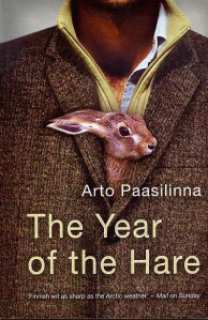The main character gives up his life completely to travel Finland with an injured hare in his pocket. And somehow he’s the sanest character in the book.
I have to hand it to Paasilinna. He has taken the old picaresque story and made it interesting with this book. You don’t often see that done anymore.
But here it is. Vatanen, our main character, decides to leave his life behind after his coworker hits a hare with their car. This may sound crazy, but Vatanen isn’t exactly leaving much behind – a loveless marriage, a job he has come to despise, and no friends.
A story like this in the hands of another writer would seem ludicrous at best and amateur at worst. But Paasilinna’s wit is here to save the day. When Vatanen’s wife calls him crying because he ruined her life (not because he was leaving, mind you), he tells her, “Cry quicker, or the call’ll get too expensive.”
Yes, if you’re going to read a Huck Finn-like story, you might as well read one by a writer with a dark wit. Paasilinna’s humor takes a bit to kick in, but when it does, it hits right in the teeth. The chapter where Vatanen and his hare meet the priest is brilliant.
But The Year of the Hare is not all fun and games. Some of the most poignant scenes in the book come when Paasilinna doesn’t give the reader what they want, like when Vatanen goes up against the vacationing drunks in the cabin next door. At first the outcome was disappointing, but the more I thought about it, the more it showed Paasilinna’s guts as a writer. It was this scene that turned The Year of the Hare from a good read into a great read.
As a side note, the translation I had could have been better. It didn’t ruin the book, but it was noticeably lacking in some parts. I mean, who knows or uses words like “nous” and “baborborygmi”?
Next up: The Stuff of Thought by Steven Pinker
Photo courtesy of Alexander Parsonage.

